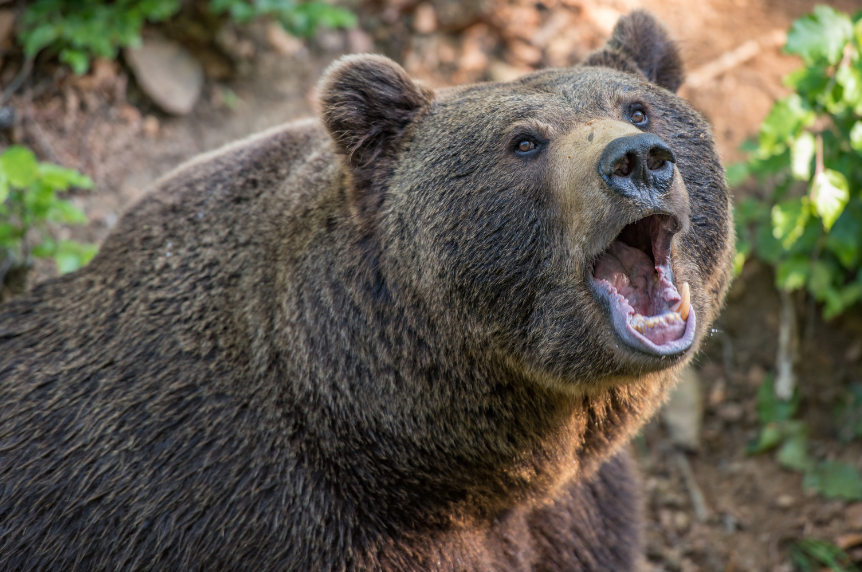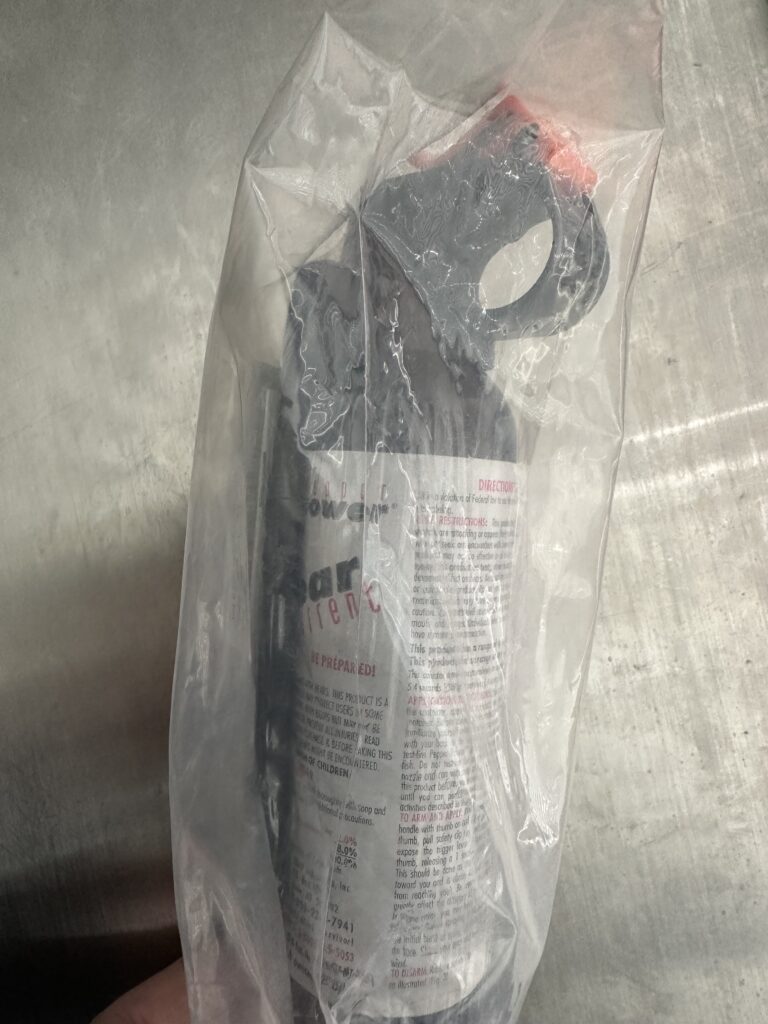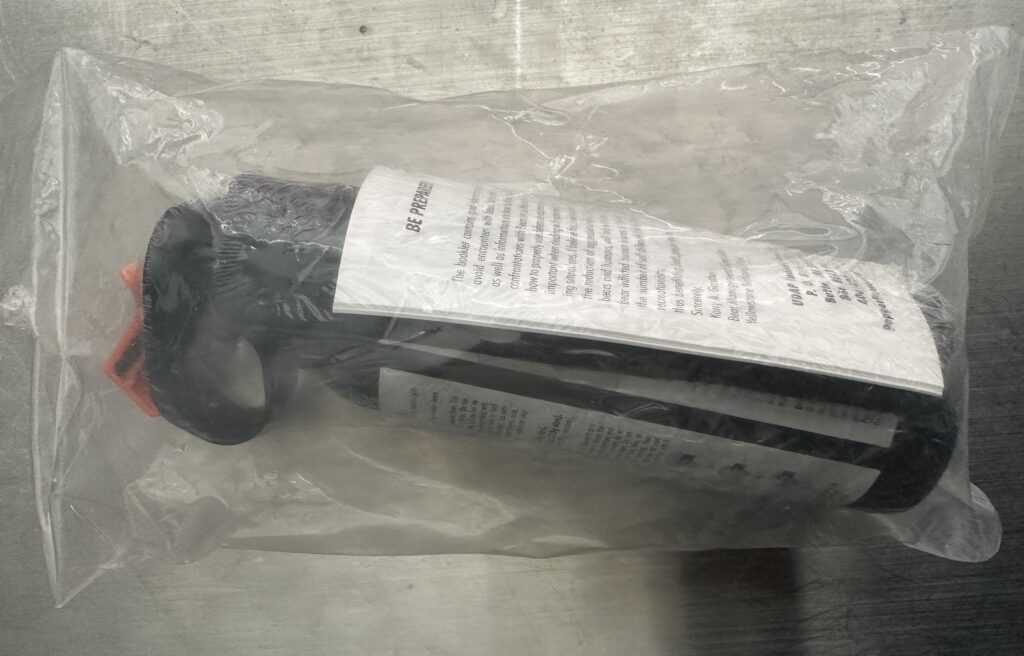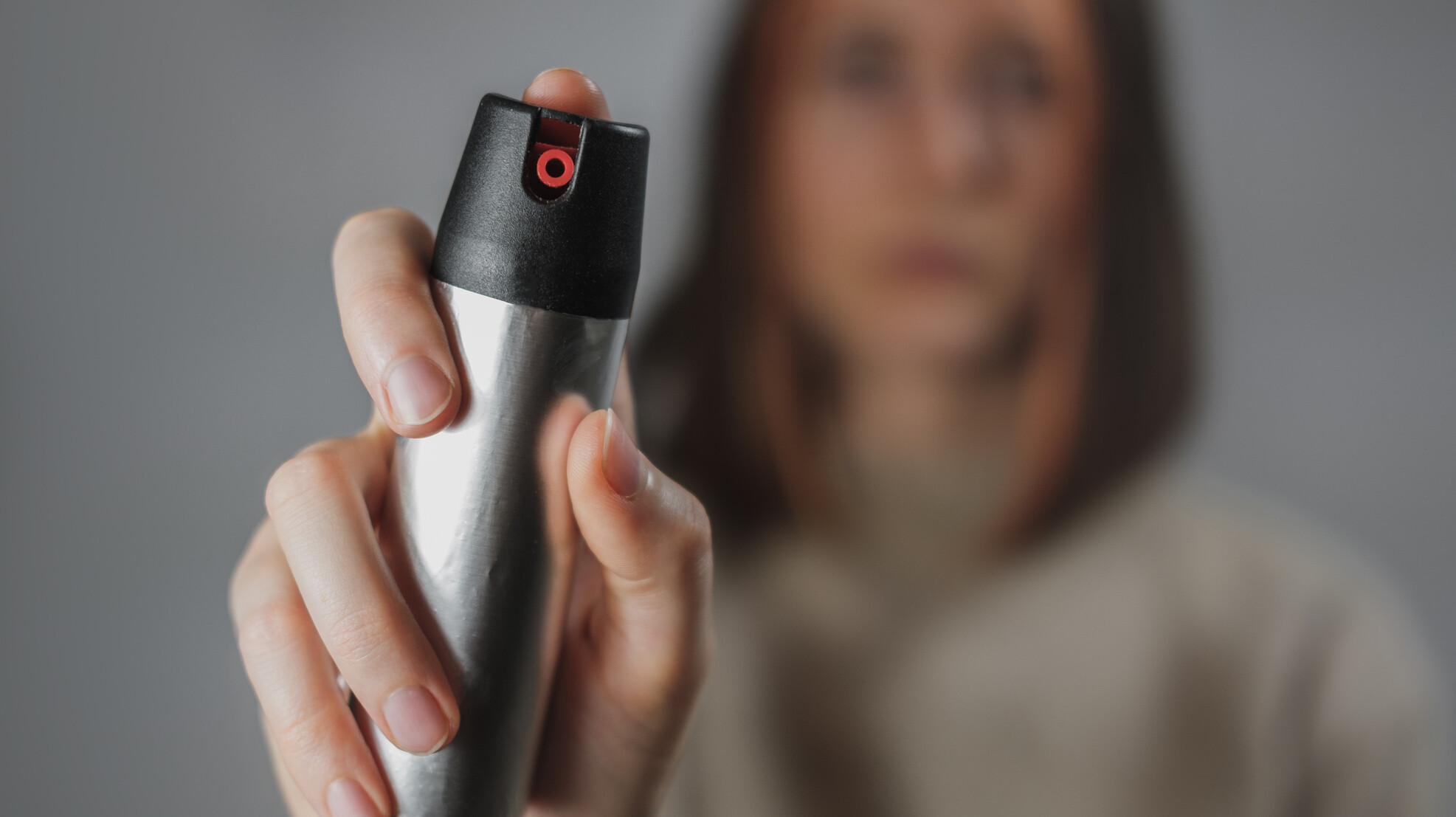You can use bear spray for self-defense against humans but it’s crucial to remember that this aerosol spray for deterring bears is not specifically designed for use on other humans.
Bear spray, also known as bear mace, is a well-known deterrent primarily used by outdoor enthusiasts and hunters to fend off aggressive bears they might encounter.
Designed with potent ingredients, it’s no wonder that many ponder its potential applications beyond the wilderness. But what makes it different, and why might it not be the ideal choice?
Dive into our comprehensive guide to understand the nuances, effectiveness, safety, and legalities surrounding its use in human confrontations.

In This Guide

How Does Bear Spray Work?
Bear spray contains capsaicin, a compound derived from chili peppers that is a source of great irritation. This active ingredient is crucial for stopping bears and potentially humans in their tracks.
It works by releasing a cloud of capsaicin and related capsaicinoids that irritate a bear’s eyes, nose, and lungs, deterring the bear from attacking or charging. These active ingredients are the same ones found in hot chili peppers and induce a burning sensation.
When you use bear spray, it creates a temporary boundary between you and the bear, making it uncomfortable and difficult for the bear to continue its aggressive behavior. The spray can extend several meters, but range varies by brand and weather conditions.
Here’s how a bear spray works in detail:
- Activation: Bear spray canisters include safety clips and triggers. Remove the safety clip and push the trigger to use the bear spray.
- Dispersion: The bear spray trigger generates a fog or cone-shaped mist. Depending on the brand, this design emits a cloud of irritants up to 30 feet.
- Exposure: The active ingredient in bear spray reacts with the eyes, nose, and respiratory system of your target. This causes a range of symptoms, such as tearing, coughing, and difficulty breathing.
- Deterrence: The pain is generally enough to incapacitate. This should be enough to stop aggression. Use this time to move away from the target to a safer place.
- Efficacy: The effects of bear spray are temporary and wear off within 30 minutes to an hour. Avoid the sprayed area, as the lingering irritant can still cause discomfort.

Can You Use Bear Spray For Self-Defense Against Humans?
Yes, bear spray can be used for self-defense against humans. In emergency situations where traditional self-defense measures are not available, bear spray could act as a temporary incapacitating agent.
However, while bear spray could technically be used for self-defense against humans, it’s really not intended for that purpose because bear spray is designed specifically with bears in mind, not people. It’s an EPA-approved insecticide for use only against bears.
The answer lies in its composition, which is similar but not identical to that of pepper spray. Bear spray actually contains a higher concentration of capsaicin and related capsaicinoids than pepper spray designed for humans.
It could cause severe eye, nose, and skin irritation, coughing, and temporary blindness. So it’s safe to say that it would be a potent deterrent.
Another thing to consider is the spray pattern. Bear spray creates this wide cloud to deter a charging bear. Pepper spray, on the other hand, is designed for a more direct hit, aimed straight at a person’s face. Other self-defense mechanisms like stun guns also offer comparative insights into their utility.

Legal Implications Of Using Bear Spray on Humans for Self-Defense
The legal implications of using bear spray on humans for self-defense can be complex and situation-dependent. While bear spray is primarily designed for deterring aggressive wildlife, its usage against humans can raise legal questions involving self-defense laws and non-lethal weapons regulations.
Some places have strict laws about using bear spray on humans or even carrying it for that purpose. Check your local regulations before carrying or using bear spray for self-defense against humans.
However, keep in mind that in a life-or-death situation, you can pretty much use any means to defend yourself. Bear spray included.
Bear Spray And Human Safety
Bear spray raises several safety considerations when used against humans. We’ll explore these factors in terms of formulation, intensity, and the potential for unintended harm.
Formulation
Capsaicin, the primary ingredient in bear spray, determines its strength and efficacy. The chemicals in bear spray are specifically designed for deterring bears. However, when used against humans, the intensity and effects could be different.
Bear spray is about twice as potent as pepper spray. The higher concentration can cause more harm to people.
Intensity of Effects
Bear spray is usually stronger than pepper spray, making its impact on humans particularly intense. The compound capsaicin plays a crucial role here.
Although bear spray is intended for animal defense, its effects on humans can be significantly intense.
All commercially available bear sprays are at least 8 ounces in size — that’s three times more than the size of tactical pepper sprays.
Bear sprays also spray in a constant stream. The continuous stream and large volume intensify its effects.
Unintended Harm
There’s a potential for unintended harm in using bear spray, particularly if misused. Wind direction, for example, can significantly affect its accuracy.
Also, the fog or cone-shaped mist can affect bystanders or the user if not used properly. This can lead to unintended harm and potentially dangerous situations.

Effects Of Bear Spray On Humans
Upon exposure, bear spray triggers a series of physical responses in humans. Its impact ranges from respiratory distress to skin irritation, all of which are mediated by its active ingredients, including capsaicin. Here are its effects on humans in detail:
Respiratory Distress
Bear spray can severely impair a person’s ability to breathe. Inhalation of bear spray aerosols can lead to shortness of breath and severe coughing. This can be dangerous for people with pre-existing respiratory conditions, such as asthma or chronic obstructive pulmonary disease (COPD).
Eye Irritation and Temporary Blindness
Bear spray’s contact with the eyes causes immense discomfort, resulting in temporary vision loss.
Skin Irritation
Bear spray can cause a burning sensation and will irritate the skin. Prolonged exposure or improper handling may result in more severe skin reactions, like painful rashes or burns, depending on its concentration. Look out for blistering or chemical burns that can result from bear spray attacks.
Allergic Reactions
Some individuals may have allergic reactions to bear spray, exacerbating its already intense effects on respiratory systems and skin. This results in more severe symptoms, such as difficulty breathing, swelling of the face or throat, or anaphylaxis.
What To Do If You Get Bear Spray On Yourself?
Immediate actions include flushing the affected areas with water and seeking medical attention, especially if symptoms persist. If you accidentally get bear spray on your skin or in your eyes, follow these steps:
- Move away from the source of the spray to avoid further exposure,
- Do not touch or rub your eyes or skin, as this can worsen the irritation,
- Flush the affected area with cool, clean water for at least 15-20 minutes. If the spray is in your eyes, keep them open while rinsing, and
- Remove any contaminated clothing and wash them separately from other clothes.
If symptoms persist or worsen, seek medical attention immediately.

FAQs About Bear Spray On Humans
Is bear spray stronger than pepper spray and what’s the difference?
Yes, bear spray is stronger than pepper spray.
Both pepper spray and bear spray have similar defensive functions aimed at temporarily incapacitating an attacker, whether human or an aggressive animal. However, the main difference is the potency of the active ingredient.
Bear spray generally surpasses pepper spray in terms of strength because it is designed for large animals such as a bear. Its formulation often consists of higher amounts of capsaicin, a compound extracted from chili peppers, blended with other elements.
Pepper spray, which is meant for humans, typically features the active ingredient oleoresin capsicum, an artificial variant of capsaicin.
Another difference between the two sprays extends to their impact duration.
Bear spray is crafted to maintain its effects for a longer period, with its active components lingering in the air like a cloud for up to 90 seconds, compared to pepper spray’s brief few seconds which has a more direct streamlined spray.
Furthermore, bear spray boasts an extended reach, typically spanning 10-20 feet depending on the brand, outdistancing pepper spray’s usual 8-10 foot range, optimized for close-range human altercations.
Does bear spray hurt more than mace?
Bear spray may cause more intense effects due to its higher concentration. However, both bear spray and mace are designed to cause pain and discomfort to deter an attacker.
Can bear spray kill humans?
While bear spray can cause significant discomfort and pain, it is not designed to be lethal. But there is a risk of severe reactions in individuals with pre-existing medical conditions, such as asthma or allergies. It could become life threatening to someone with an anaphylactic response to the spray.
Is it illegal to walk around with bear spray?
Laws regarding carrying bear spray vary by jurisdiction. In areas with large bear populations, it may be legal to carry bear spray for protection against bears.
In some places, it may be restricted or prohibited. It is important to check local laws and regulations before carrying bear spray for any purpose.
How long does it take for bear spray to wear off your skin?
The effects of bear spray on the skin can last anywhere from 30 minutes to an hour, depending on the level of exposure.
To minimize discomfort, flush the affected area with cool water. Avoid rubbing your eyes or skin after touching affected areas.

Key Takeaways: Can You Use Bear Spray For Self-Defense Against Humans?
Bear spray does indeed work on humans for self-defense due to its high concentration of irritants.
However, the discussion about using bear spray for human self-defense brings forth questions about its effectiveness, the legal implications of its use, and the potential hazards involved.
Keep in mind the following:
- Bear spray is designed for deterring aggressive bears, not for human confrontations.
- Using bear spray on humans can have legal repercussions in many regions.
- While bear spray can temporarily incapacitate humans, it’s not as effective as personal defense sprays meant for human threats and carries potential health risks upon exposure.
If your goal is personal safety against human threats, exploring alternatives specifically tailored for such situations might be a wiser and safer choice.
Stay safe, be informed, and choose your self-defense tools wisely!
ABOUT THE AUTHOR
Angie Montgomery is the co-founder of Monday Day Prepping. She and her husband Bill have been "prepper's" since 2008. When she's not helping manage the homestead, she enjoys teaching her two boys how to cook and make natural alternatives to cleaners and other household items.


0 Comments